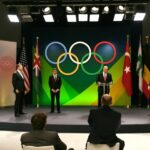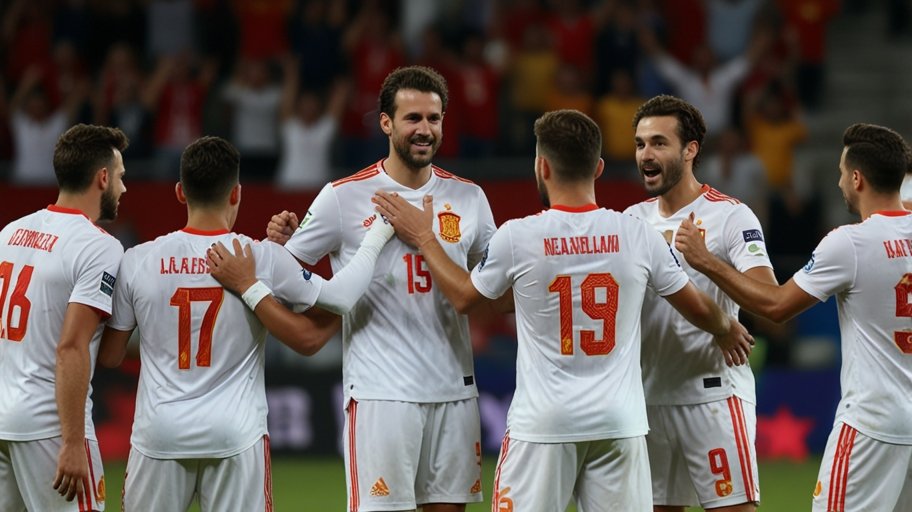Defending champions Spain secured their place in the UEFA Nations League semifinals after a nail-biting penalty shootout victory over the Netherlands, setting up a mouthwatering clash with France in Stuttgart this summer.
The dramatic contest saw Spain pegged back three times in a thrilling 3-3 draw after extra time, resulting in a 5-5 aggregate score before prevailing 5-4 in the shootout.
The match in Valencia began with Mikel Oyarzabal converting an early penalty to put the hosts ahead. Still, Memphis Depay equalized from the spot in the 54th minute to level the proceedings.
Oyarzabal restored Spain’s advantage midway through the second half following a swift counterattack, only for defender Ian Maatsen to strike back and send the game into extra time.
Barcelona wonderkid Lamine Yamal appeared to have settled matters when he put the Spanish ahead again in the 103rd minute with a neat finish.
Still, the resilient Dutch refused to surrender as midfielder Xavi Simons found the equalizer to force penalties. Barcelona midfielder Pedri ultimately scored the decisive spot kick after goalkeeper Unai Simón saved Donyell Malen’s effort.
France also required penalties to overcome Croatia after leading 2-0 after 90 minutes to level their tie and force extra time. Michael Olise curled in a 52nd-minute free kick for his first international goal before setting up Ousmane Dembélé ten minutes from time to make it 2-2 on aggregate, with Dayot Upamecano eventually scoring the decisive penalty following goalkeeper Mike Maignan’s brilliant save from Josip Stanisic.
The French victory came despite captain Kylian Mbappé extending his goal drought to seven matches for the national team, his most extended barren spell at the international level. The superstar forward remains stuck on 48 goals for France but did hold his nerve to convert in the penalty shootout at the Stade de France.
Germany and Portugal complete the semifinal lineup, with the Germans holding off a spirited Italy comeback to secure a 5-4 aggregate victory despite a 3-3 draw in Dortmund.
The hosts raced to a three-goal lead in the first half but were forced to endure a tense finale as Giacomo Raspadori’s penalty deep into stoppage time brought Italy within one goal of forcing extra time.
Portugal overturned their first-leg deficit against Denmark with a 5-2 victory after extra time in Lisbon. Francisco Trincão scored twice late on to seal the win, though Cristiano Ronaldo missed an early penalty opportunity that could have made the evening more comfortable for the hosts.
The Nations League semifinals will commence on June 4, with Germany hosting Portugal in Munich. The clash between France and Spain in Stuttgart on June 5 will follow. The final is scheduled for June 8, providing football fans with high-quality international competition during the summer months.
The tournament has grown significantly in prestige since its inception. It offers competitive fixtures between European nations outside of traditional World Cup and European Championship qualifiers.
These matches provide valuable experience for the participating teams and allow managers to assess their squads in high-pressure environments before next year’s World Cup.
Greece secured promotion to League A after overturning a 1-0 deficit with an impressive 3-0 win in Scotland. 17-year-old midfielder Konstantinos Karetsas was among the scorers.
Turkey also gained promotion to the top tier following a 3-0 victory in Hungary. They completed a comprehensive 6-1 aggregate win, with Hakan Çalhanoğlu converting a penalty to set them on their way.
Belgium narrowly avoided relegation from League A thanks to veteran striker Romelu Lukaku, who scored two late goals in a 3-0 victory over Ukraine to overturn their 3-1 first-leg deficit. Hungary and Scotland dropped down to League B, while Ireland maintained their position in the second tier after defeating Bulgaria 2-1 for a 4-2 aggregate win.
The Nations League semifinals will feature some of the most talented players in world football. Spain’s young stars Pedri and Yamal will face off against France’s attacking talents Mbappé, Dembélé, and Olise.
Germany will rely on its experienced core to challenge Portugal’s blend of veterans and emerging talents in what promises to be an enthralling contest in Munich.
These matches represent crucial opportunities for the coaches to fine-tune tactics and strategies ahead of the 2026 World Cup qualification campaign.
Spain manager Luis de la Fuente will be looking to build on their Nations League success, while Didier Deschamps aims to add another trophy to France’s impressive collection under his leadership.
The tournament’s format has successfully eliminated meaningless friendly matches and created genuine competition between nations of similar strength.
The promotion and relegation system ensures teams face appropriate challenges, with Greece and Turkey now set to test themselves against Europe’s elite in the next edition.
As anticipation builds toward the summer showdowns, football fans across Europe can look forward to seeing their national teams compete at the highest level.
The Nations League has established itself as a significant tournament in its own right, bridging the gap between major championships and providing compelling international football during traditionally quieter periods.
With the 2026 World Cup on the horizon, these Nations League matches take on added significance as teams begin positioning themselves for the expanded 48-team tournament in North America.
The performances in Stuttgart and Munich this June could provide valuable insights into which European nations might challenge for global supremacy next year.
The success of the Nations League demonstrates football’s continued evolution. Governing bodies are finding innovative ways to create meaningful competition that benefits players, coaches, and fans alike. As the semifinalists prepare for their summer showdowns, the stage is set for another chapter in European football’s rich history to unfold.









